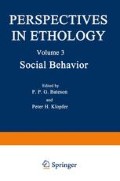Abstract
The recurrent idea that human history is a special case of the actions of evolutionary law and is therefore in some sense predictable from evolutionary law is, itself, of major historical importance.
This idea is shown to be invalid since human individual behavior is remarkably free of evolutionary constraints. In fact, humans have the biological property that much of the motivation for their behavior is related to their own socially derived image of themselves, which minimizes the significance of natural selection for or against specific human behaviors. The capacity to develop such an image is not widespread among animals but is shared by man and certain apes. The fact that evolutionary law is not coercive on human history has moral and political implications.
Access this chapter
Tax calculation will be finalised at checkout
Purchases are for personal use only
Preview
Unable to display preview. Download preview PDF.
References
Alexander, R. D. (1974). The evolution of social behavior. Annu. Rev. Ecol. Syst. 5:325–383.
Alexander, R. D. (1975). The search for a general theory of behavior. Behav. Sci. 20(2):77–100.
Ardrey, R. (1966). The Territorial Imperative. Atheneum, New York.
Ayala, F. J. (1974). The concept of biological progress. In Ayala, F. J., and Dobzhansky, T. (eds.), Studies in the Philosophy of Biology, Macmillan, London.
Barzun, J. (1958). Darwin, Marx, and Wagner: A Critique of a Heritage, Doubleday, New York.
Braudel, F. (1972). The Mediterranean World in the Age of Philip II, translated from the French by S. Reynolds, Harper and Row, New York.
Carson, H., Hardy, D. E., Speith, H. T., and Stone, W. S. (1970). The evolutionary biology of the Hawaiian Drosophilidae. In Hecht, M. K., and Steere, W. C. (eds.), Essays in Evolution and Genetics in Honor of Theodosius Dobzhansky. Appleton-Century-Crofts, New York, pp. 437–543.
Cervantes Saavedra, Miguel de. (1968). El retablo de las maravillas, Entremeses, Prologo y notas de J. A. Franch, Las America Publishing Co., New York.
Cooley, C. H. (1964). Human Nature and the Social Order, Shocken Books, New York.
Fisher, R. A. (1930). The Genetical Theory of Natural Selection, Clarendon, Oxford.
Gallup, Jr., G. G. (1969). Chimpanzees: Self-recognition. Science 167:86–87.
Gallup, Jr., G. G. (1974). Toward an operational definition of self-awareness. In Tuttle, R. H. (ed.), IXth International Congress of Anthropological and Ethnological Sciences, Primatology Session, Subsection D, Mouton Press, The Hague.
Grant, M. (1916). The Passing of the Great Race or the Racial Basis of European History, Scribner’s, New York.
Huizinga, J. (1950). Homo Ludens; A Study of the Play Element in Culture, Beacon Press, Boston.
Kamin, L. J. (1974). The Science and Politics of I.Q., Halsted Press Division, Wiley, New York.
Koenig, O. (1975). Biologie der uniform. In Ditfurth, H. v. (ed.), Evolution ein Querschnitt der Forschung, Hoffman und Campe, Hamburg, pp. 175–211.
Lewontin, R. C. (1974). The Genetic Basis of Evolutionary Change. Columbia University Press, New York.
Mead, G. H. (1934). Mind, Self and Society from the Standpoint of a Social Behaviorist, Morris, C. W. (ed.), University of Chicago Press, Chicago.
Merleau-Ponty, J. (1964). The Primacy of Perception, Northwestern University Press, Evanston, Ill.
Morris, D. (ed.) 1967. Primate Ethology: Essays on the Sociosexual Behavior of Apes and Monkeys, Aldine, Chicago.
Rapoport, A. (ed.). (1975). Uses of game theoretic models in biology. General Systems: Yearbook of the Society for General Systems Research, Volume 20, Society for General Systems Research, Washington, D.C. pp. 49–58.
Roth, C. (1964). The Spanish Inquisition, Norton, New York.
Sahlins, M. (1976). The Use and Abuse of Biology, an Anthropological Critique of Sociobiology, University of Michigan Press, Ann Arbor, Mich.
Slobodkin, L. B. (1961). Growth and Regulation of Animal Populations, Holt, Rinehart, and Winston, New York.
Slobodkin, L. B. (1968). Toward a predictive theory of evolution. In Lewontin, R. (ed.), Population Biology and Evolution, Syracuse University Press, Syracuse, N.Y., pp. 187–205.
Slobodkin, L. B. (1975). Die Strategie der Evolution. In Ditfurth, H. v. (ed.), Evolution: Ein Querschnitt der Forschung. Hoffman und Campe, Hamburg, pp. 33–55.
Slobodkin, L. B. (1978). The peculiar evolutionary strategy of man. Transactions of the Boston Colloquium of Philosophy of Science, Vol. 31, in press.
Slobodkin, L. B., and Rapoport, A. (1974). An optimal strategy of evolution. Q. Rev. Biol. 49(3):181–200.
Spengler, O. (1934). The Decline of the West, Knopf, New York.
Trivers, R. L. (1971). The evolution of reciprocal altruism. Q. Rev. Biol. 46(4):35–57.
Vayda, A. (1976). War in Ecological Perspective, Plenum, New York.
Waddington, C. H. (1957). The Strategy of the Genes, Allen and Unwin, London.
Warner, R. (1950). The Greek Philosophers, Menton, New York.
Wilson, E. O. (1975). Sociobiology: The New Synthesis. Belknap Press of Harvard University Press, Cambridge, Mass.
Author information
Authors and Affiliations
Editor information
Editors and Affiliations
Rights and permissions
Copyright information
© 1978 Plenum Press, New York
About this chapter
Cite this chapter
Slobodkin, L.B. (1978). Is History a Consequence of Evolution?. In: Bateson, P.P.G., Klopfer, P.H. (eds) Social Behavior. Perspectives in Ethology, vol 3. Springer, Boston, MA. https://doi.org/10.1007/978-1-4684-2901-5_10
Download citation
DOI: https://doi.org/10.1007/978-1-4684-2901-5_10
Publisher Name: Springer, Boston, MA
Print ISBN: 978-1-4684-2903-9
Online ISBN: 978-1-4684-2901-5
eBook Packages: Springer Book Archive

